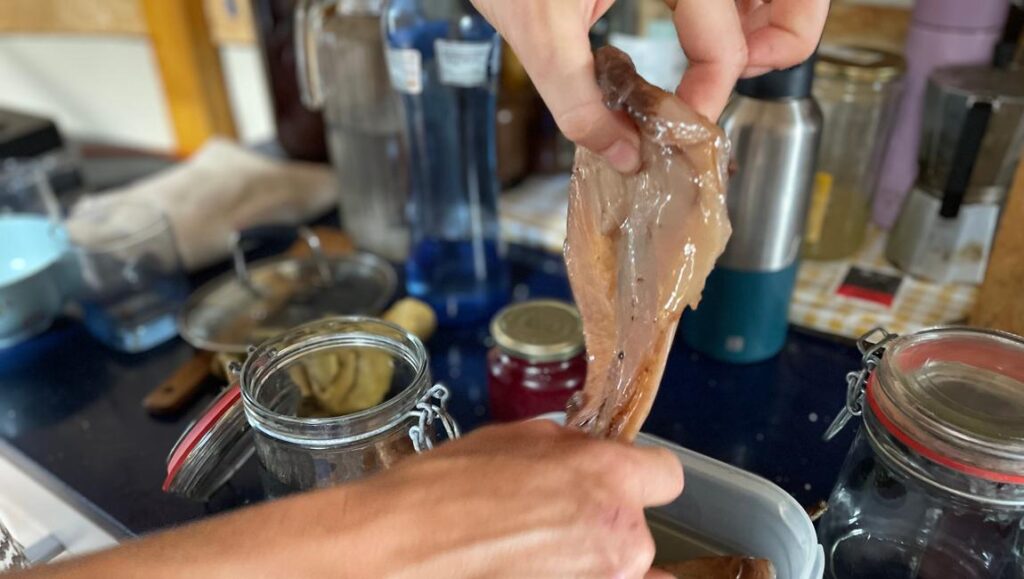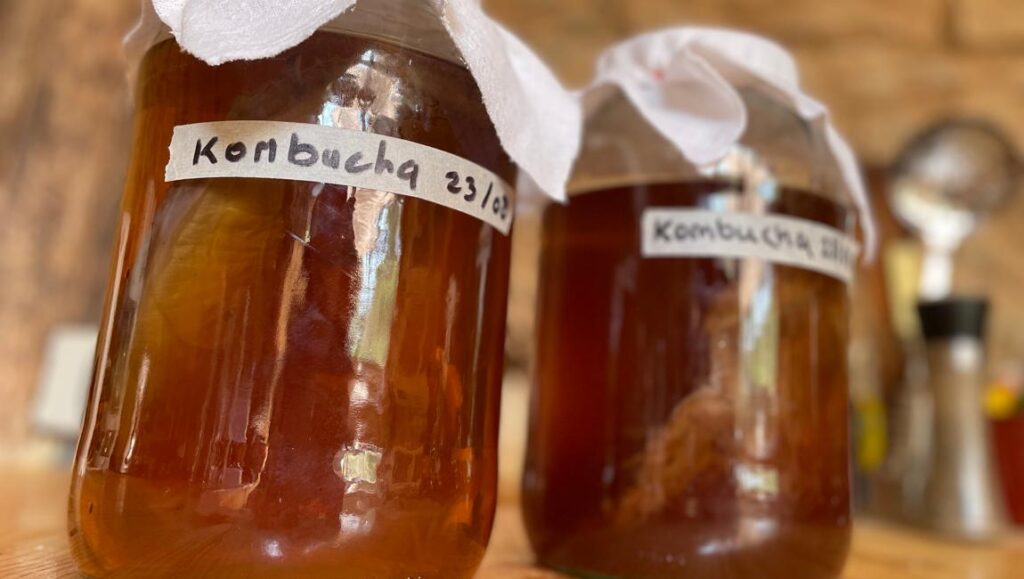We’ve started making our own Kombucha. For those who don’t know what it is… Kombucha is a delightful, effervescent tea that has been celebrated for centuries. With its tangy flavor and slight fizziness, it’s like soda’s healthier, more sophisticated cousin. But what exactly is kombucha? It’s a fermented tea drink made by combining sweetened tea with a SCOBY (Symbiotic Culture of Bacteria and Yeast). The SCOBY ferments the tea, transforming it into a slightly sour, lightly carbonated beverage packed with probiotics and other beneficial compounds.
Health Benefits of Kombucha
Kombucha is more than just a trendy drink; it’s packed with potential health benefits. Here’s why sipping on kombucha could be a great addition to your wellness routine.
- Probiotics: The Good Gut Bugs
One of the biggest draws of kombucha is its probiotic content. Probiotics are beneficial bacteria that support a healthy gut microbiome. A healthy gut is linked to everything from improved digestion to better mood and immunity. Regularly consuming probiotic-rich foods like kombucha can help maintain a balanced gut flora. - Antioxidants: Fighting Free Radicals
Kombucha, especially when made with green tea, is rich in antioxidants. These compounds help protect your body from damage caused by free radicals, which are unstable molecules that can contribute to chronic diseases and aging. Drinking kombucha may support your body’s natural defense systems. - Detoxification: Helping Your Body Cleanse
Kombucha contains glucuronic acid, a compound that can bind to toxins in the body, helping to flush them out through the kidneys. This natural detoxification process can support liver function and overall health. - Immune Support: Boosting Your Defenses
The combination of probiotics, antioxidants, and vitamins in kombucha can help support a healthy immune system. The beneficial bacteria in kombucha may also help ward off harmful pathogens, keeping you healthier. - Potential Aid in Weight Management
Some studies suggest that the acetic acid produced during kombucha fermentation can help regulate blood sugar levels and reduce fat accumulation. While kombucha alone isn’t a magic weight-loss solution, it can be a healthy, low-calorie alternative to sugary drinks. - Mental Health Benefits
Your gut and brain are closely connected, a relationship known as the gut-brain axis. The probiotics in kombucha may positively influence this connection, potentially helping to reduce symptoms of anxiety and depression. The B vitamins found in kombucha also support brain health. - May Support Cardiovascular Health
Kombucha has been linked to improved cholesterol levels and blood sugar regulation, both of which are important for heart health. While more research is needed, these potential benefits make kombucha a heart-healthy choice.
The Kombucha Brewing Process: Turning Tea into Magic
Making kombucha might sound like a complex science experiment, but it’s actually pretty straightforward. We’ve explained it step-by-step so you can also start to brewing your own kombucha at home.
Step 1: Gather Your Ingredients and Supplies
To start, you’ll need:
- Tea: Black or green tea works best. Avoid herbal teas, which can lack the necessary nutrients.
- Sugar: Regular white sugar is preferred. The SCOBY consumes most of the sugar during fermentation, so don’t worry about it being too sweet.
- SCOBY: This jelly-like disk is the heart of your kombucha. You can purchase one online or get one from a friend. Make sure it sits in some Kombucha (as starter tea)
- Starter Tea: This is simply kombucha from a previous batch or store-bought. It helps kickstart the fermentation process.
- Water: Filtered water is best to avoid chlorine or other chemicals that could harm the SCOBY.
- A Large Glass Jar: For fermenting the tea.
- A Cloth and Rubber Band: To cover the jar and keep out dust while allowing the kombucha to breathe.
- Bottles for Storage: Glass bottles with tight-sealing lids are ideal for storing and flavoring your kombucha.
Step 2: Brew the Sweetened Tea
Start by brewing a large batch of tea. We use 2 bags of (black) tea and 20 grams (about 2 tablespoons) of white sugar per liter. Since we typically work with a 3-liter bottle, that means 6 tea bags and 60 grams of sugar in total.
The easiest method we’ve found is to boil 1 liter of water (a kettle works great), then add all the tea bags and all the sugar to it. Let it steep for about an hour. After that, pour in 2 liters of cold/lukewarm water and give it a good stir.
This brings the tea to just the right temperature — not too hot, which is important because hot tea can damage your SCOBY!
Step 3: Add the SCOBY and Starter Tea
Pour the cooled tea into your glass jar. Then, add about 1 cup of starter tea (usually comes with the SCOBY). Gently place your SCOBY into the jar (you might need to rinse it beforehand). It may sink or float, and either is fine. The SCOBY will work its magic wherever it ends up.
Step 4: Fermentation – The Waiting Game
Cover the jar with a cloth secured with a rubber band. Place it in a warm, dark place, like a cupboard, and let it ferment for 7 to 10 days. During this time, the SCOBY will consume the sugar and convert the tea into kombucha. You can taste the kombucha after a week to see if it’s to your liking. The longer it ferments, the tangier it will become.
Step 5: Bottling and Flavoring
Once your kombucha has reached your preferred flavor, it’s time to bottle it. Remove the SCOBY and set it aside along with some of the kombucha for your next batch (this is your new starter tea). Pour the kombucha into bottles, leaving a little space at the top.
This is also the time to add flavors! Fresh fruit, ginger, herbs, and spices are all great options. Once flavored, seal the bottles tightly. Store them at room temperature for a few days to allow carbonation to develop, then transfer to the fridge.
Step 6: Enjoy Your Homemade Kombucha
After the second fermentation, your kombucha is ready to drink! Pop open a bottle and enjoy the refreshing fizz and unique flavor. Your homemade kombucha will keep in the fridge for a month or more.


